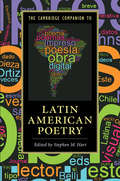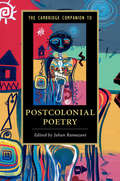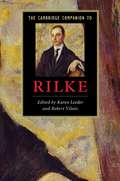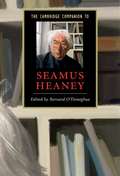- Table View
- List View
The Cambridge Companion to Eighteenth-Century Poetry
by John SitterThe Cambridge Companion to Eighteenth-Century Poetry analyzes major premises, preoccupations, and practices of English poets writing from 1700 to the 1790s. These specially-commissioned essays avoid familiar categories and single-author approaches to look at the century afresh. Chapters consider such large poetic themes as nature, the city, political passions, the relation of death to desire and dreams, appeals to an imagined future, and the meanings of â sensibility'. Other chapters explore historical developments such as the connection between poetic couplets and conversation, the conditions of publication, changing theories of poetry and imagination, growing numbers of women poets and readers, the rise of a self-consciously national tradition, and the place of lyric poetry in thought and practice. The essays are well supported by supplementary material including a chronology of the period and detailed guides to further reading. Altogether the volume provides an invaluable resource for scholars and students.
The Cambridge Companion to Elizabeth Bishop
by Angus Cleghorn Jonathan EllisElizabeth Bishop is increasingly recognized as one of the twentieth century's most important and original poets. Initially celebrated for the minute detail of her descriptions, what John Ashbery memorably called her thinginess, Bishop's reputation has risen dramatically since her death, in part due to the publication of new work, including letters, stories, and visual art, as well as a controversial volume of uncollected poems, drafts, and fragments. This Companion engages with key debates surrounding the interpretation and reception of Bishop's published and unpublished writing in relation to questions of biography, the natural world, and politics. Individual chapters focus on well-known texts such as North & South, Questions of Travel, and Geography III, while offering fresh readings of the significance of Nova Scotia, Massachusetts, and Brazil to Bishop's life and work. With a chronology and guide to further reading, this volume explores the full range of Bishop's artistic achievements and the extent to which the posthumous publications have contributed to her enduring popularity.
The Cambridge Companion to Emily Dickinson
by Wendy MartinEmily Dickinson, one of the most important American poets of the nineteenth century, remains an intriguing and fascinating writer. The Cambridge Companion to Emily Dickinson includes eleven new essays by accomplished Dickinson scholars. They cover Dickinson's biography, publication history, poetic themes and strategies, and her historical and cultural contexts. As a woman poet, Dickinson's literary persona has become incredibly resonant in the popular imagination. She has been portrayed as singular, enigmatic, and even eccentric. At the same time, Dickinson is widely acknowledged as one of the founders of American poetry, an innovative pre-modernist poet as well as a rebellious and courageous woman. This volume introduces new and practised readers to a variety of critical responses to Dickinson's poetry and life, and provides several valuable tools for students, including a chronology and suggestions for further reading.
The Cambridge Companion to English Poetry Donne to Marvell
by Thomas N. CornsEnglish poetry in the first half of the seventeenth century is an outstandingly rich and varied body of verse, which can be understood and appreciated more fully when set in its cultural and ideological context. This student Companion, consisting of fourteen new introductory essays by scholars of international standing, informs and illuminates the poetry by providing close reading of texts and an exploration of their background. There are individual studies of Donne, Jonson, Herrick, Herbert, Carew, Suckling, Lovelace, Milton, Crashaw, Vaughan and Marvell. More general essays describe the political and religious context of the poetry, explore its gender politics, explain the material circumstances of its production and circulation, trace its larger role in the development of genre and tradition, and relate it to contemporary rhetorical expectation. Overall the Companion provides an indispensable guide to the texts and contexts of early-seventeenth-century English poetry.
The Cambridge Companion to English Poets
by Claude RawsonThis volume provides lively and authoritative introductions to twenty-nine of the most important British and Irish poets from Geoffrey Chaucer to Philip Larkin. The list includes, among others, Shakespeare, Donne, Milton, Wordsworth, Browning, Yeats and T. S. Eliot, and represents the tradition of English poetry at its best. Each contributor offers a new assessment of a single poet's achievement and importance, with readings of the most important poems. The essays, written by leading experts, are personal responses, written in clear, vivid language, free of academic jargon, and aim to inform, arouse interest, and deepen understanding.
The Cambridge Companion to John Donne
by Achsah GuibboryThe Cambridge Companion to John Donne, first published in 2006, introduces students (undergraduate and graduate) to the range, brilliance, and complexity of John Donne. Sixteen essays, written by an international array of leading scholars and critics, cover Donne's poetry (erotic, satirical, devotional) and his prose (including his Sermons and occasional letters). Providing readings of his texts and also fully situating them in the historical and cultural context of early modern England, these essays offer the most up-to-date scholarship and introduce students to the current thinking and debates about Donne, while providing tools for students to read Donne with greater understanding and enjoyment. Special features include a chronology; a short biography; essays on political and religious contexts; an essay on the experience of reading his lyrics; a meditation on Donne by the contemporary novelist A. S. Byatt; and an extensive bibliography of editions and criticism.
The Cambridge Companion to John Dryden
by Steven N. ZwickerJohn Dryden, Poet Laureate to Charles II and James II, was one of the great literary figures of the late seventeenth century. This Companion provides a fresh look at Dryden's tactics and triumphs in negotiating the extraordinary political and cultural revolutions of his time. The newly commissioned essays introduce readers to the full range of his work as a poet, as a writer of innovative plays and operas, as a purveyor of contemporary notions of empire, and most of all as a man intimate with the opportunities of aristocratic patronage as well as the emerging market for literary gossip, slander and polemic. Dryden's works are examined in the context of seventeenth-century politics, publishing and ideas of authorship. A valuable resource for students and scholars, the Companion includes a full chronology of Dryden's life and times and a detailed guide to further reading.
The Cambridge Companion to Latin American Poetry (Cambridge Companions to Literature)
by Stephen M. HartThe Cambridge Companion to Latin American Poetry provides historical context on the evolution of the Latin American poetic tradition from the sixteenth century to the present day. <P><P>It is organized into three parts. Part I provides a comprehensive, chronological survey of Latin American poetry and includes separate chapters on Colonial poetry, Romanticism/modernism, the avant-garde, conversational poetry, and contemporary poetry. Part II contains six succinct essays on the major figures Sor Juana Inés de la Cruz, Gabriela Mistral, César Vallejo, Pablo Neruda, Carlos Drummond de Andrade, and Octavio Paz. Part III analyses specific and distinctive trends within the poetic canon, including women's, LGBT, Quechua, Afro-Hispanic, Latino/a and New Media poetry. This Companion also contains a guide to further reading as well as an essay on the best English translations of Latin American poetry. It will be a key resource for students and instructors of Latin American literature and poetry.<P> Proposes a comprehensive and up-to-date view of Latin American poetry, including evaluations of twenty-first-century Latin American poetry; Contains a special section on modern trends in Latin American poetry, such as LGBT, Latino/a and New Media poetry; This book has a broader coverage than other companions to Latin American poetry - several essays explore Brazilian as well as Spanish-American poetry.
The Cambridge Companion to Latin Love Elegy
by Thea S. ThorsenLatin love elegy is one of the most important poetic genres in the Augustan era, also known as the golden age of Roman literature. This volume brings together leading scholars from Australia, Europe and North America to present and explore the Greek and Roman backdrop for Latin love elegy, the individual Latin love elegists (both the canonical and the non-canonical), their poems and influence on writers in later times. The book is designed as an accessible introduction for the general reader interested in Latin love elegy and the history of love and lament in Western literature, as well as a collection of critically stimulating essays for students and scholars of Latin poetry and of the classical tradition.
The Cambridge Companion to Lucretius
by Philip Hardie Stuart GillespieLucretius' didactic poem De rerum natura ('On the Nature of Things') is an impassioned and visionary presentation of the materialist philosophy of Epicurus, and one of the most powerful poetic texts of antiquity. After its rediscovery in 1417 it became a controversial and seminal work in successive phases of literary history, the history of science, and the Enlightenment. In this 2007 Cambridge Companion experts in the history of literature, philosophy and science discuss the poem in its ancient contexts and in its reception both as a literary text and as a vehicle for progressive ideas. The Companion is designed both as an accessible handbook for the general reader who wishes to learn about Lucretius, and as a series of stimulating essays for students of classical antiquity and its reception. It is completely accessible to the reader who has only read Lucretius in translation.
The Cambridge Companion to Milton
by Dennis DanielsonAn accessible, helpful guide for any student of Milton, whether undergraduate or graduate, introducing readers to the scope of Milton's work, the richness of its historical relations, and the range of current approaches to it. This second edition contains several new and revised essays, reflecting increasing emphasis on Milton's politics, the social conditions of his authorship and the climate in which his works were published and received, a fresh sense of the importance of his early poems and Samson Agonistes, and the changes wrought by gender studies on the criticism of the previous decade. By contrast with other introductions to Milton, this Companion gathers an international team of scholars, whose informative, stimulating and often argumentative essays will provoke thought and discussion in and out of the classroom. The Companion's reading lists and extended bibliography offer readers the necessary tools for further informed exploration of Milton studies.
The Cambridge Companion to Modern American Poetry
by Walter KalaidjianThe Cambridge Companion to Modern American Poetry comprises original essays by nineteen distinguished scholars. It offers a critical overview of major and emerging American poets of the twentieth century, in addition to critical accounts of the representative schools, movements, regional settings, archival resources, and critical reception that define modern American poetry. The Companion stretches the narrow term of "literary modernism" - which encompasses works published from approximately 1890 to 1945 - to include a more capacious and usable account of American poetry's evolution from the twentieth century to the present. The essays collected here seek to account for modern American verse against the contexts of broad political, social, and cultural fields and forces. This volume gathers together major voices that represent the best in contemporary critical approaches and methods.
The Cambridge Companion to Modernist Poetry
by Alex Davis Lee M. JenkinsThis 2007 Companion offers the most comprehensive overview available of modernist poetry, its forms, its major authors and its contexts. The first part explores the historical and cultural contexts and sexual politics of literary modernism and the avant garde. The chapters in the second part concentrate on individual authors and movements, while the concluding part offers a comprehensive overview of the early reception and subsequent canonisation of modernist poetry. As well as insightful readings of canonical poets, the Companion features extended discussions of poets whose importance is now being increasingly recognised, such as Mina Loy, poets of the Harlem Renaissance, and postcolonial poets in the Caribbean, Africa and India. While modernist poets are often thought of as difficult, these essays will help students to understand and enjoy their experimental, playful and fascinating responses to contemporary social and cultural change and their dialogue with the arts and with each other.
The Cambridge Companion to Nineteenth-Century American Poetry
by Kerry LarsonThis Companion is the first critical collection of its kind devoted solely to American poetry of the nineteenth century. It covers a wide variety of authors, many of whom are currently being rediscovered. A number of anthologies in the recent past have been devoted to the verse of groups such as Native Americans, African-Americans and women. This volume offers essays covering these groups as well as more familiar figures such as Dickinson, Whitman, Longfellow and Melville. The contents are divided between broad topics of concern such as the poetry of the Civil War or the development of the 'poetess' role and articles featuring specific authors such as Edgar Allan Poe or Sarah Piatt. In the past two decades a growing body of scholarship has been engaged in reconceptualizing and re-evaluating this largely neglected area of study in US literary history - this Companion reflects and advances this spirit of revisionism.
The Cambridge Companion to Ovid
by Philip HardieOvid was one of the greatest writers of classical antiquity, and arguably the single most influential ancient poet for post-classical literature and culture. In this Cambridge Companion, chapters by leading authorities from Europe and North America discuss the backgrounds and contexts for Ovid, the individual works, and his influence on later literature and art. Coverage of essential information is combined with exciting critical approaches. This Companion is designed both as an accessible handbook for the general reader who wishes to learn about Ovid, and as a series of stimulating essays for students of Latin poetry and of the classical tradition.
The Cambridge Companion to Piers Plowman
by Andrew Cole Andrew GallowayPiers Plowman has long been considered one of the greatest poems of medieval England. Current scholarship on this alliterative masterpiece looks very different from that available even a decade ago. New information about the manuscripts of the poem, new historical discoveries, and new investigations of its literary, cultural and theoretical scope have fundamentally altered the very meaning of Langland's art. This Companion thus critically surveys traditional scholarship, with the aim of recuperating its best insights, and it ventures forth into newer areas of inquiry attuned to questions of social setting, institutional context, intellectual and literary history, theory, and the revitalized fields of codicology and paleography. By proceeding through chapters that offer cumulatively wider views as well as stand-alone analyses of topics most crucial to understanding Piers Plowman, this Companion gives serious students and seasoned scholars alike up-to-date knowledge of this intricate and beautiful poem.
The Cambridge Companion to Postcolonial Poetry
by Jahan RamazaniThe Cambridge Companion to Postcolonial Poetry is the first collection of essays to explore postcolonial poetry through regional, historical, political, formal, textual, gender, and comparative approaches. The essays encompass a broad range of English-speakers from the Caribbean, Africa, South Asia, and the Pacific Islands; the former settler colonies, such as Canada, Australia, and New Zealand, especially non-Europeans; Ireland, Britain's oldest colony; and postcolonial Britain itself, particularly black and Asian immigrants and their descendants. The comparative essays analyze poetry from across the postcolonial anglophone world in relation to postcolonialism and modernism, fixed and free forms, experimentation, oral performance and creole languages, protest poetry, the poetic mapping of urban and rural spaces, poetic embodiments of sexuality and gender, poetry and publishing history, and poetry's response to, and reimagining of, globalization. Strengthening the place of poetry in postcolonial studies, this Companion also contributes to the globalization of poetry studies.
The Cambridge Companion to Rilke
by Karen Leeder Robert VilainOften regarded as the greatest German poet of the twentieth century, Rainer Maria Rilke (1875-1926) remains one of the most influential figures of European modernism. In this Companion, leading scholars offer informative and thought-provoking essays on his life and social context, his correspondence, all his major collections of poetry including most famously the Duino Elegies and Sonnets to Orpheus, and his seminal novel of Modernist anxiety, The Notebooks of Malte Laurids Brigge. Rilke's critical contexts are explored in detail: his relationship with philosophy and the visual arts, his place within modernism and his relationship to European literature, and his reception in Europe and beyond. With its invaluable guide to further reading and a chronology of Rilke's life and work, this Companion will provide an accessible, engaging account of this extraordinary poet whose legacy looms so large today.
The Cambridge Companion to Robert Frost
by Robert FaggenThis 2001 collection of specially-commissioned essays by experts in the field explores key dimensions of Robert Frost's poetry and life. Frost remains one of the most memorable and beguiling of modern poets. Writing in the tradition of Virgil, Milton, and Wordsworth, he transformed pastoral and georgic poetry both in subject matter and form. Mastering the rhythms of ordinary speech, Frost made country life the point from which to view the world and the complexities of human psychology. The essays in this volume enable readers to explore Frost's art and thought, from the controversies of his biography to his subtle reinvention of poetic and metric traditions and the conflicts in his thought about politics, gender, science and religion. This volume will bring fresh perspectives to the lyric, narrative and dramatic poetry of an American master, and its chronology and guide to further reading will prove valuable to scholars and students alike.
The Cambridge Companion to Seamus Heaney
by Bernard O'DonoghueSeamus Heaney is a unique phenomenon in contemporary literature, as a poet whose individual volumes (such as his Beowulf translation, and individual volumes of poems such as Electric Light and District and Circle) have been high in the bestseller lists for decades. Since winning the Nobel Prize for Literature, he has come to be considered one of the most important English language poets in the world. This Companion gives an up-to-date overview of his career thus far, and of his reception in Ireland, England and around the world. Its distinguished contributors offer detailed readings of all his major publications, in poetry, prose and translation. The essays further explore the central themes of his poetry, his relations with other writers, and his prose writing. Designed for students, this volume will also have much to interest and inform the general reader and admirer of Heaney's unique poetic voice.
The Cambridge Companion to Shelley
by Timothy MortonPercy Bysshe Shelley (1792-1822) was an extraordinary poet, playwright and essayist, revolutionary both in his ideas and in his artistic theory and practice. This 2006 collection of original essays by an international group of specialists is a comprehensive survey of the life, works and times of this radical Romantic writer. Three sections cover Shelley's life and posthumous reception; the basics of his poetry, prose and drama; and his immersion in the currents of philosophical and political thinking and practice. As well as providing a wide-ranging look at the state of existing scholarship, the Companion develops and enriches our understanding of Shelley. Significant new contributions include fresh assessments of Shelley's narratives, his view of philosophy, and his role in emerging views about ecology. With its chronology and guide to further reading, this lively and accessible Companion is an invaluable guide for students and scholars of Shelley and of Romanticism.
The Cambridge Companion to Spenser
by Andrew HadfieldIn this accessible and rigorous introduction to Spenser, fourteen specially-commissioned essays provide all the essential information required to appreciate and understand Spenser's rewarding and challenging work. The Companion guides the reader through Spenser's poetry and prose, and provides extensive commentary on his life, the historical and religious context in which he wrote, his wide reading in Classical, European and English poetry, his sexual politics and use of language. A chronology and further reading lists make this volume indispensable for any student of Spenser.
The Cambridge Companion to Sylvia Plath
by Jo GillThe controversies that surround Sylvia Plath's life and work imply that her poems are more read and studied now than ever before. This Companion provides a comprehensive and authoritative overview of the place in twentieth-century culture of Sylvia Plath's poetry, prose, letters and journals. The newly commissioned essays by leading international scholars represent a spectrum of critical perspectives. They pay particular attention to key debates and to well-known texts such as The Bell Jar, while offering original and thought-provoking readings to new as well as more seasoned Plath readers.
The Cambridge Companion to T. S. Eliot
by A. David MoodyAn international team of leading T. S. Eliot scholars contribute studies of different facets of the writer's work to build up a carefully coordinated and fully rounded introduction. Five chapters give a complete account of Eliot's poems and plays, while others assess the major aspects of his life and thought. Later chapters place his work in historical perspective. There is a full review of Eliot studies, and a useful chronological outline. Taken as a whole, this Companion comprises an essential handbook for students and readers of T. S. Eliot.
The Cambridge Companion to Ted Hughes
by Terry GiffordThis is a story of the raw grief of a mother who loses her son and whose life is transformed in the process. Some people live life at a higher pace-and depths- than most of us . Adam Pinkerfield was one of those people and he was deeply loved by those he touched. Sadly one day he flew too high and didn't come back. This book is his mother Sharon's story of the trauma that followed and the multitude of experiences and learnings that came from this deeply sad event. Take several deep breaths before you enter with her, let yourself be touched, moved and even shaken as her story unfolds. Always remember, in every tragedy, however dreadful, hidden somewhere is a blessing. Leo Rutherford, Shaman and author.




